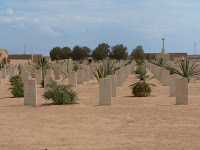I was up at 04.30 as it was an early start for the border crossing to Egypt. Just before Caroline woke up, a bird sang really beautifully just outside our open balcony. The tranquillity was broken as the call to prayer started. Strangely, that did not make the dogs bark, but they had barked at a few other things during the night.
Sue had taken responsibility for looking after the tip money and had run out of dinars in Tunisia. I had a surplus, so Sue and I had done a swap: dinars for dollars. I had a even larger surplus of Libyan dinars because I had scarcely eaten anything and Sue and I did another swap so that she had enough for the tips for Mahmoud, Darak and Ali. I was not the only person to have a surfeit of Libyan dinars and we all hoped that we would be able to change them at the border. This was one of the problems with Ruth not having done the trip before: she did not know whether it would be possible and her notes said we could only change dollars.
 |
| Desert |
There was some pleasant scenery at the start of our journey, with the Green Mountains to our right. Mahmoud pointed out the place where St Mark was supposed to have lived and where there is a church named after him. Unfortunately, it was not long before we had passed the mountains and were back to barren desert, strewn with rubbish.
 |
| Acroma Knightsbridge War Cemetery |
Our first real stop of the day was at the Acroma Knightsbridge War Cemetery, just before Tobruk. Like all war cemeteries, this was beautifully maintained. There are 3,671 graves here and, once again, I found it all incredibly sad.
 |
| Acroma Knightsbridge War Cemetery |
As we drove nearer to Tobruk, we passed unfinished apartment blocks. There seemed to be a lot of construction in progress throughout Libya, sometimes in the middle of nowhere. We seldom saw any signs of work being done though.
 |
| Tobruk Commonwealth War Cemetery |
After a stop at a supermarket for supplies, we went to Tobruk Cemetery. A silent bell from HMS Liverpool hung outside. Inside were thousands of graves. The non-British graves were mostly for Polish soldiers, but I also saw Czechs and French graves. Kim said that he had seen some Australian ones.
 |
| Tobruk Commonwealth War Cemetery |
After Tobruk, we had a final stop for coffee and gave Tarik, Mahmoud and Ali their tips. Ali did not seem to be expecting one as he had been imposed on us by the authorities, but that was also true of Mahmoud really. We felt that Ali had been useful in getting us free access to Leptis Magna on the second day and access to the Roman Villa that afternoon. He gave a nice little speech, which Mahmoud translated for us.
We headed on to the border. As we passed through the town nearest the border, Mahmoud said that no one who lived there had a proper job because everyone was a smuggler. He said that they all had dual nationality to make the border crossing easier. At least one person was working though, because I saw someone making clothes at a small table in the open.
The border crossing was a waiting game. Mahmoud took our passports and disappeared for ages. Luckily, Darak was able to pull the bus under an arch, so we were in the shade. I was at the back of the bus, so I could still see the sparrows and pied wagtails hopping about. At long last Mahmoud rematerialised and we drove on. Ali had been gone for some time and Kim wondered if he had been busy writing his report on us. He came back eventually and we were able to say our goodbyes before walking the 100 yards to Egypt.




No response to “Libya - 9 October 2010 (1)”
Post a Comment